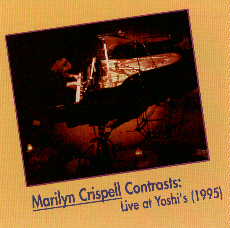
Marilyn Crispell: Contrasts: Live at Yoshi's (1995).

Women's History Month at HurdAudio is moving into its final days with a fond listen to Contrasts: Live at Yoshi's (1995) featuring the pure pleasure of hearing solo piano music by Marilyn Crispell. Yoshi's of
This epic piano experience opens with a medly of "Contrasts" by Marilyn Crispell and "Gesture Without Plot" by Annette Peacock. Crispell skillfully plays chord clusters that turn linear and at times melodic with frequent allusions to the original harmonic cluster material. The energy level shifts rapidly between tranquil and explosively percussive. The Peacock melody seems to emerge from this initial texture like a mist in the wake of a rain storm. Marilyn Crispell is the complete improviser. In this cohesive opening track she's convincingly proven a talent for expressive extremes.
"Dancing" is an impressive and focused track. Short, rapid lines form the molecular structure of this piece as they are balanced against an intermittent percussive accompaniment and occasional forays into the lower register of the piano. This eight minute track possibly best captures the essence of the Marilyn Crispell sound that keeps me hungry to hear more.
Another juxtaposition follows of "Ruthie's Song" by Crispell and "Turn Out the Stars" by Bill Evans. I assume that the title "Ruthie's Song" is a reference to Evans' "Waltz for Ruth" as this track takes a turn toward the lyricism associated with the late Bill Evans. There are several improvisational elements here that sound Evans-esque while the energy behind it is all Crispell. Even the harmonic voicings and rhythmic pull take on the Bill Evans sound throughout this track. Impressive. It's a difficult sound to pull off and yet sounds so effortlessly accomplished here.
"Flutter" then follows as a segue back into Crispell's own piano sound. The melodic focus melts into a sea of rhythmic exploration as the full keyboard becomes a drum of infinite harmonic potential. Streams of trickling lines scrape softly like brushes on a snare between more forceful expressions of varying density.
With "Professor of Air Science" by Mark Helias, Crispell returns to a melodically oriented sound. The quality of playing between original free improvised composition and improvised interpretation of other people's music is balanced perfectly as Crispell sounds confident in both roles.
"Cousin Judi" starts in after a brief pause as Crispell returns to her own compositional universe. The density of material seems to escalate over the course of this piece as motifs are repeated, elaborated and expanded to include harmonic clusters and increasingly independent lines spread across the range of this instrument. The reiteration of the melodic and/or rhythmic properties of a set of motifs gives this improvisation a strong overall cohesion while still allowing for a wide palette of free improvised material.
A second Bill Evans oriented medly follows with "Little Chiquita" by Crispell and "Time Remembered" (an all time favorite Bill Evans composition of mine). This is a beautiful treatment of a great melodic line.
This listening experience concludes with a medly of "Starshine" by Crispell and "The Night Has a Thousand Eyes" by Weisman, Garrett and Wayne that remains true to the "contrasts" of sounds and textures present in this performance.


No comments:
Post a Comment